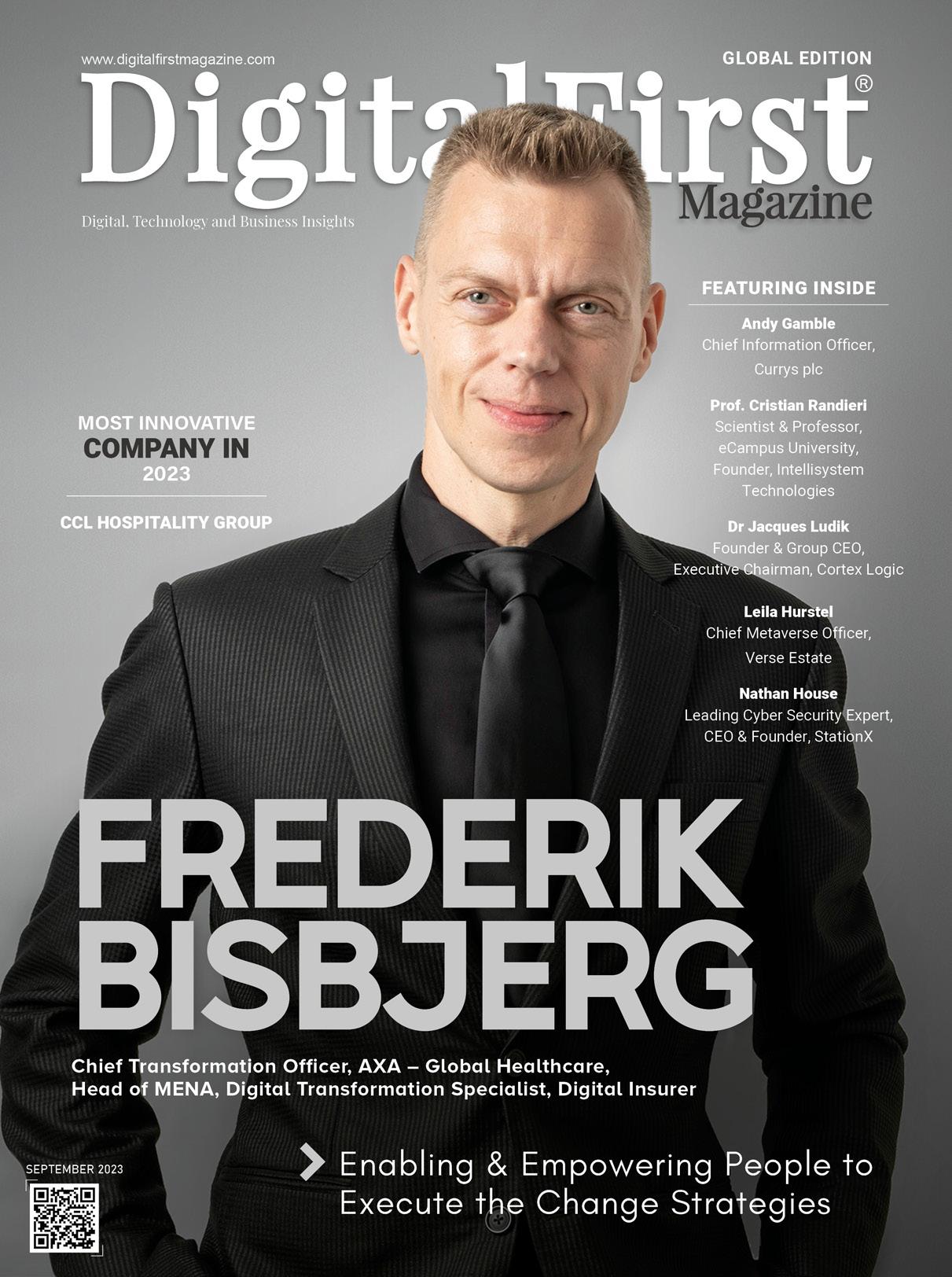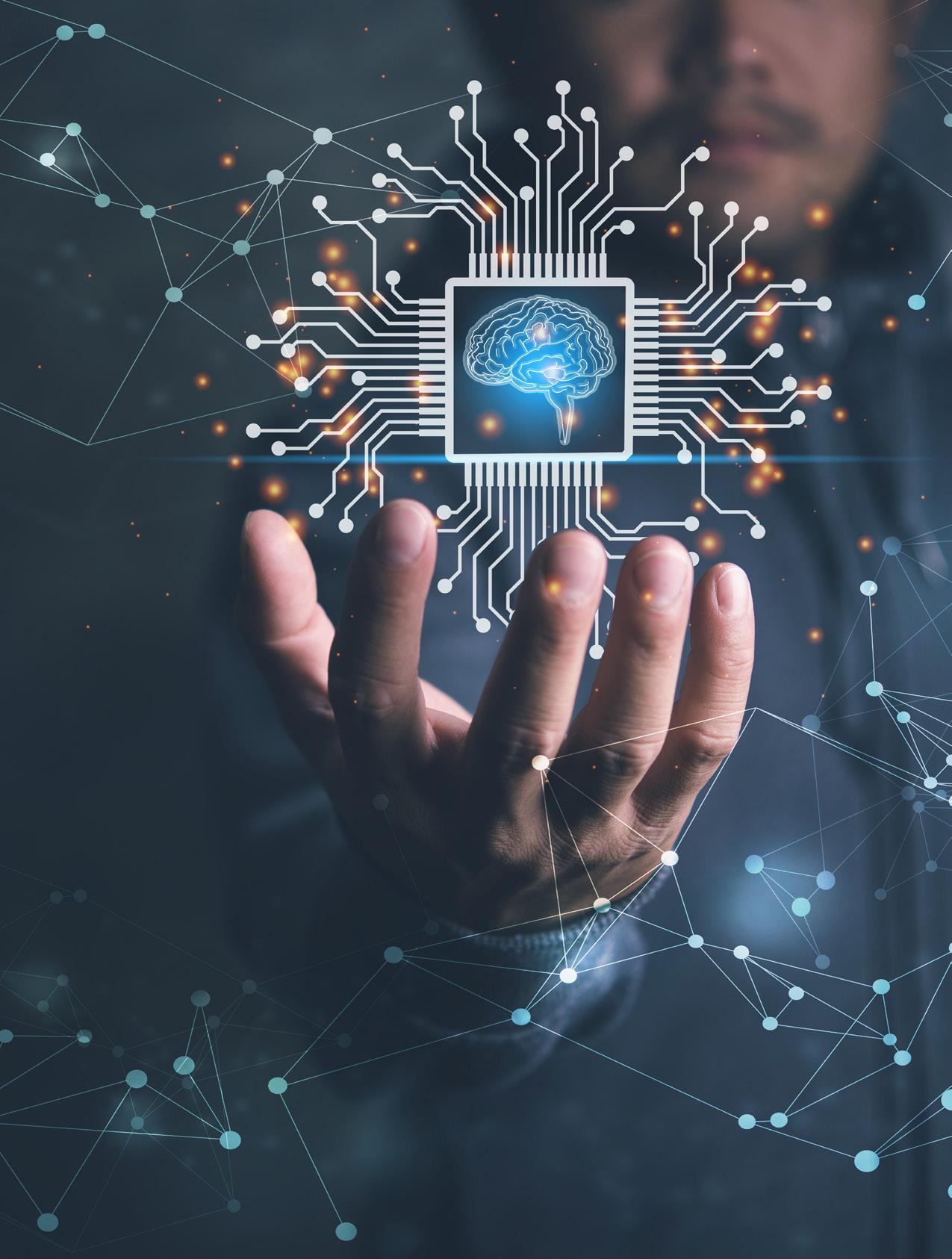





Managing Editor
Sarath Shyam
Consultant Editors
Dr. John Andrews
Emma James
Andrew Scott
Sabrina Samson
Naomi Wilson
Stanly Lui
Steve Hope
Keith Alexander
Creative Consultants
Charlie Jameson
Louis Bernard
Shirley David
Branding & Marketing Partnerships
Jennifer Anderson
Monica Davis
Jessica Edword
Rachel Roy
Anna Elza
Stephen Donnell
Cathy Chen
Enquiry admin@digitalfirstmagazine.com

International Representation
Americas
16192 Coastal Highway, Lewes, DE 19958, USA
Europe
27, Old Gloucester Street, London, WC1N 3AX, UK
Middle East & Africa
P.O. Box 48299, Dubai Silicon Oasis, Dubai, UAE




Asia-Pacific
Ramanashree Arcade, 18 MG Road, Bangalore, India
Digital First Magazine is a digital magazine published by Connecta Innovation Private Limited. All rights reserved. The opinions expressed in the content are those of the authors. They do not purport to reflect the opinions or views of the Connecta Innovation Private Limited or any of its members or associates. The publisher does not assume any responsibility for the advertisements and all representation of warranties made in such advertisements are those of the advertisers and not of the publisher. Digital First trademark is owned by DFG Digital First Infotech Pvt Ltd. and Connecta Innovation Pvt Ltd. has permission to use Digital First brand name.
Digital First Magazine is a Free Subscription digital magazine strictly not for sale and has to be strictly for internal private use only. Publisher does not assume any responsibility arising out of anyone printing copy of this digital magazine in any format and in any country and all matters related to that.
4 Digital First Magazine September 2023 September 2023 Vol - 4 Issue - 10 www.digitalfirstmagazine.com
Free Subscription
Pioneering the Future of Senior Care and Healthcare
care. In this exploration of the vanguard of senior care and healthcare, we embark on a journey to uncover the stories, strategies, and statistics behind the transformation.
In this special issue of Digital First Magazine, we have identified one such company: CCL Hospitality Group, a prominent player in the culinary and support services industry, which is making waves with a progressive approach to the client and consumer experience. With its four distinct operating companies — Morrison Living, Coreworks, Unidine and The HUB
— the group keeps a keen eye on the everevolving retirement and recovery industries to offer its clients optimal solutions in a competitive market.

In the ever-evolving landscape of healthcare and Senior Living Hospitality, innovation isn’t merely an option; it’s a necessity. As our global population ages, the demand for high-quality healthcare and senior living services has never been more pronounced. The challenges are clear: How do we provide personalized, efficient care to an aging demographic, ensuring not just longevity but a fulfilling quality of life?
The answer lies in the innovative spirit of companies that have dared to reimagine these sectors, bridging the gap between cutting-edge technology and compassionate
On the cover, we feature Frederik Bisbjerg, a highly respected international business developer with expertise in digital transformation and business model innovation. His proven and numerous successes with worldwide business transformations come from his belief in enabling and empowering people to execute change strategies.
Join us on this enlightening voyage as we celebrate the visionaries, the trailblazers, and the companies that are not just shaping the future but also improving the lives of our seniors and the healthcare landscape for all. Enjoy Reading.

5 Digital First Magazine September 2023
MANAGING
NOTE
Sarath Shyam
EDITOR’S



6 Digital First Magazine September 2023 CONTENTS CCL Hospitality Group The Future of Senior Living Hospitality: Personalizing the Consumer Experience with Innovation and Technology 18 MOST INNOVATIVE COMPANY IN 2023
FREDERIK BISBJERG

IN MY VIEW

7 Digital First Magazine September 2023
ENABLING & EMPOWERING PEOPLE TO EXECUTE THE CHANGE STRATEGIES 10 COVER STORY Nathan House,
Cyber Security Expert,
Fostering a Safer, More Secure Digital World, One Learner at a Time 30
Chief Transformation Officer, AXA – Global Healthcare, Head of MENA, Digital Transformation Specialist, Digital Insurer
Leading
CEO & Founder, StationX




8 Digital First Magazine September 2023 CONTENTS
Cristian Randieri, Scientist & Professor, eCampus University & Founder, Intellisystem Technologies The Risks and Rewards of AI and the Singularity: Balancing Innovation with Responsibility 46 Andy Gamble, Chief Information Officer, Currys plc Retail’s Tech Transformation and a Rapid Move to Omnichannel 40 Leila Hurstel,
Metaverse Officer, Verse Estate, Tech Innovator, &
Embrace the Future: How Autonomous AI Agents are Transforming Industries and Job Roles 58
Prof.
Chief
Board Member
Logic AI and Web3: The Next Generation of the Internet for a Decentralized World 52 LEADER’S INSIGHTS EXPERT OPINION
Dr
Jacques Ludik, Founder & Group CEO, Executive Chairman, Cortex
Want to Sell or find Investor for your Business?
9 Digital First Magazine September 2023 Digital First Magazine August 2021
COVER STORY


FREDERIK BISBJERG
Chief Transformation Officer, AXA – Global Healthcare, Head of MENA, Digital Transformation Specialist, Digital Insurer
ENABLING & EMPOWERING PEOPLE TO EXECUTE THE CHANGE STRATEGIES

Frederik Bisbjerg is a highly respected international business developer with expertise in digital transformation and business model innovation. His proven and numerous successes with worldwide business transformations come from his belief in enabling and empowering people to execute change strategies.
Currently, Frederik is a Chief Transformation Officer with AXA Global Healthcare and further holds the position of Head of MENA and Digital Transformation specialist with the Digital Insurer, the world’s largest knowledge base on digital insurance with more than 35,000 active members. With The Digital Insurer, he is part of the World’s first mini-MBA in Digital Insurance, where he lectures on the topics of Strategy and Transformation, Big Data, and Best Practice Tech Architectures.
In an exclusive interview with Digital First Magazine, Frederik shared his insights on the key benefits of digital transformation in the healthcare industry, his career trajectory, success mantra, pearls of wisdom, and much more. The following excerpts are taken from the interview.
COVER STORY
According to you, what are the key benefits of digital transformation in the healthcare industry?
Digital transformation in the healthcare industry offers a wide range of benefits that improve patient care, streamline operations, and enhance overall efficiency. Here are some key benefits:
Improved Patient Care and Outcomes
Digital transformation allows for better patient data management, leading to more accurate diagnoses and treatment plans. Electronic health records (EHRs) enable healthcare professionals to access patients’ medical histories, test results, and treatment plans quickly and securely, leading to better-informed decisions and coordinated care.

12 Digital First Magazine September 2023
Enhanced Communication and Collaboration
Digital tools facilitate seamless communication among healthcare providers, including doctors, nurses, specialists, and even patients. This improves care coordination and reduces the chances of errors due to miscommunication. Telemedicine and virtual consultations enable
remote patient care, particularly beneficial in rural or underserved areas – just look at China’s more than 2,000 internet hospitals.
Efficient Data Management
Digital transformation enables the collection, storage, and analysis of vast amounts of healthcare data. This data can be used to identify trends, patterns, and potential outbreaks, leading to more effective disease prevention and management strategies.
Personalized Treatment Plans
With access to comprehensive patient data, healthcare providers can create personalized treatment plans based on individual medical histories, genetics, and lifestyle factors. This approach can lead to more effective treatments and better patient outcomes.
Reduced Administrative Burden
Automation of administrative tasks, such as appointment scheduling, billing, and insurance claims processing, reduces the administrative burden on healthcare staff. This allows them to focus more on patient care and less on paperwork.
Cost Savings
Digital transformation leads to significant cost savings by streamlining and automating processes, reducing the need for physical storage of paper records, minimizing manual data entry errors, and improving overall operational efficiency.

Enhanced Patient Engagement
Digital platforms provide patients with access to their health information, enabling them to actively participate in their own care. Patient
13 Digital First Magazine September 2023
I BELIEVE IT’S MY CURIOSITY ABOUT HOW THINGS WORK AND MY TRUE PASSION FOR BRINGING PEOPLE ALONG THE ‘RIDE OF CHANGE’
portals, mobile apps, and wearable devices empower patients to track their health metrics and communicate with healthcare providers more effectively.
Regulatory Compliance
Digital systems can help healthcare organizations adhere to regulatory requirements and security standards for patient data privacy and protection, such as HIPAA in the United States.
With disruption and transformation being everywhere, what are the challenges you see facing your sector right now? How can we overcome those challenges?
Implementing digital transformation in the insurance industry is a complex endeavor due to a variety of challenges we face. These challenges comes from factors like legacy IT systems, organizational silos, bureaucratic processes, and a culture resistant to change.
Most insurers have built their IT infrastructure over several decades, resulting in a complex web of legacy systems that may be outdated, inflexible, and difficult to integrate with modern digital solutions. These systems
can hinder the adoption of new technologies and impede the seamless flow of information across the organization.
Adding to this, insurance companies have departments that work in isolation, creating silos that prevent effective collaboration and communication. Digital transformation requires a holistic approach that breaks down these silos to enable cross-functional teams to work together on projects and initiatives.
We are – and have historically been riskaverse and slow to adopt change due to concerns about potential disruptions to existing processes. Typically, you’ll face a culture that values stability and predictability over innovation and agility. Convincing employees to embrace digital tools and methods can be challenging in such an environment.
Transitioning to a digital-focused organization requires a workforce with the necessary digital skills and expertise. Many employees, especially those who have been with the company for a long time, often lack the skills to effectively use and leverage new technologies, and this leads to resistance from stakeholders, including senior leadership, employees, and even customers. They resist digital transformation
14 Digital First Magazine September 2023
EMPATHY IS A DRIVING FORCE. FORWARDLOOKING LEADERS UNDERSTAND THAT TRANSFORMATION INVOLVES PEOPLE, AND THEY PRIORITIZE THE WELL-BEING AND GROWTH OF THEIR TEAMS
due to concerns about job security, usability, or changes to familiar processes.
And then of course, the return on investment. While digital transformation can offer significant long-term benefits, the initial investment required for technology adoption and implementation may not always have an immediate, clear return on investment. Convincing stakeholders of the long-term benefits can be challenging.
Frederik, please tell us about yourself and your background. How did you get into the digital transformation space?
Since the beginning of my career, I’ve been working with business transformation – that’s more than 25 years ago now, and over time business transformation simply turned into digital transformation as the transformation tools became increasingly digital.

15 Digital First Magazine September 2023
You are also the Head of MENA, Digital Transformation Specialist at Digital Insurer. Can you please tell us about this unique platform and your role in it?
TDI ‘s purpose is to help individuals & companies across the industry explore, learn, and deliver digital, for the benefit of insurance professionals, their employers, the broader industry, insurance customers and society as a whole. I’m proud to be part of a community of more than 40,000 insurance professionals, coming together to accelerate digital insurance.
I was part of launching the World’s first mini-MBA in digital insurance in 2019, and I am still lecturing there, and taking active part of the many interesting and relevant activities around digital insurance – I strongly urge readers to visit the website and sign up for a free membership. It’s definitely worth it! The Digital Insurer - The World’s Largest Digital Insurance Platform (the-digital-insurer.com)
In your opinion, what are the imperative qualities that our forward-looking leaders must adopt to transform businesses for the future?
Forward-looking leaders must possess a set of imperative qualities to successfully guide their organizations through transformation for the
SINCE THE BEGINNING OF MY CAREER, I’VE BEEN WORKING WITH BUSINESS TRANSFORMATION – THAT’S MORE THAN 25 YEARS AGO NOW, AND OVER TIME BUSINESS TRANSFORMATION SIMPLY TURNED INTO DIGITAL TRANSFORMATION AS THE TRANSFORMATION TOOLS BECAME INCREASINGLY DIGITAL

16 Digital First Magazine September 2023
future. Adaptability stands as a cornerstone, as leaders need to embrace change and be open to new ideas, technologies, and paradigms
Strategic vision is equally vital. future leaders must possess a clear understanding of where our industry is headed and how their organization can capitalize on emerging opportunities
As mentioned earlier, silos are critical issues in changing organizations, so leaders must bridge silos and promote cross-functional teamwork. The ability to communicate a compelling narrative is essential; leaders must convey the “why” behind transformation initiatives to rally employees around a shared purpose
Empathy is a driving force. Forwardlooking leaders understand that transformation involves people, and they prioritize the wellbeing and growth of their teams. They empower employees by providing learning opportunities and recognizing their contributions.
Lastly, ethical leadership underpins success. These leaders must navigate complex ethical dilemmas, ensuring that their transformation efforts consider societal, environmental, and cultural impacts
What, personally, has allowed you the success you have had in the role of a digital transformation leader?
I believe it’s my curiosity about how things work and my true passion for bringing people along the ‘ride of change’. I’m also able to explain complex problems in a way that the entire workforce understands, making it easier to create a compelling vision for change – this also enables me to make especially senior leadership understand better the digital drivers of change, and why it need not be as complex and expensive as they might think
What are your passions outside of work?
I’m passionate about taking the whole family offroading in the deserts surrounding Abu Dhabi – we have the largest sand desert in the world, ‘The Empty Quarters’, and it’s exhilarating to bring our dune buggies there, camp, and have fun driving around and enjoying the quiet and grandness of the outdoors – as a quite opposite, I enjoy scuba-diving with me wife, too, so it’s quite two different kinds of adventures.
Personally, I love to keep fit doing Thai Boxing which I’ve been doing for more than a decade now – I like the intensity of the sport and the fact it keeps my (ageing) body strong and flexible.
One word that best describes how you work.
I believe in ‘success by design.’
What is your biggest goal? Where do you see yourself in 5 years from now? Ask me in 4.9 years from now… ;-)
What would your advice be to other leaders who are about to embark on similar journeys of business transformation?
Be ready to face tremendous resistance –as head of transformation, you’ll be the embodiment of change, which the fewest people like to ‘put onto them’. Prepare for the resistance and do all you can to engage and motivate the teams to join you on the journey – but you also need to be ready to make some tough calls and have open and direct conversations with the people that simply don’t want to change.
17 Digital First Magazine September 2023
CCL Hospitality Group
The Future of Senior Living Hospitality: Personalizing the Consumer Experience with Innovation and Technology
CCL Hospitality Group, a prominent player in the culinary and support services industry, is making waves with a progressive approach to the client and consumer experience. With its four distinct operating companies — Morrison Living, Coreworks, Unidine and The HUB — the group keeps a keen eye on the everevolving retirement and recovery industries to offer its clients optimal solutions in a competitive market. CCL Hospitality Group’s comprehensive range of services spans culinary expertise, supply chain and purchasing management, operations optimization, nutrition and wellness, talent acquisition and
retention, retail and design, data and analytics, housekeeping and environmental services.
As interests and service expectations of the population are shifting, so must the organizations that offer hospitality-centric services. Through research, focus groups and interviews, CCL was able to identify a gap in the market in the provision of customizable, hospitality-forward solutions. “Our vision for CCL Hospitality Group emerged from a clear recognition of the need for tailored and better hospitality services,” states Dan Natterman, CEO of CCL Hospitality Group. “We saw an opportunity to reimagine the
18 Digital First Magazine September 2023
MOST INNOVATIVE COMPANY IN 2023


20 Digital First Magazine September 2023
With a client-centric approach, CCL Hospitality Group remains committed to meeting the unique needs and preferences of each client
industry beyond the limitations of traditional food service management. By strategically positioning the operating companies under the parent company, CCL Hospitality Group, we can better leverage our collective expertise, resources and unwavering commitment to excellence that we bring to our clients’ communities.”

The operating companies — Morrison Living, Coreworks, Unidine and The HUB — are better positioned to deliver unapparelled service solutions as a result of CCL Hospitality Group’s significant scale and its innovative and forward-thinking approach.
“We recognize the importance of economies of scale in today’s competitive business landscape,” Natterman explains. “Through corporate and regional support, our teams have access to vast resources and infrastructure that allow for more efficient operations, effective management and a deeper understanding of data-driven insights, which lead to identifying opportunities and solutions that help our clients thrive.”
CCL Hospitality Group’s Unique Approach to Outsourcing
CCL Hospitality Group stands out from its competitors by adopting a distinctive method of outsourcing that goes beyond the conventional one-size-fits-all management style. Rather than solely providing food and support services management, the company takes a more consultative approach built on collaboration, communication and informed decision-making. This approach involves aligning with the mission and vision of partner communities, enabling a deep understanding of what is most important and the critical business objectives and opportunities at hand. Embracing this way of thinking allows CCL Hospitality Group to approach each client with tactical strategies to help address their unique needs more effectively. Additionally, CCL’s methodology is strengthened by applying research and insights to developing and
21 Digital First Magazine September 2023

22 Digital First Magazine September 2023
applying forward-thinking processes that allow them to tailor their services to achieve better results.
“Our strength lies in our teams and their expertise and commitment to service. Through their passion and unwavering commitment to excellence, supported by the parent company’s access to resources and scale, CCL Hospitality Group’s vision of delivering hospitality-centric and unparalleled experiences becomes a reality,” adds Dan.
Appealing to the current and prospective senior and healthcare service consumers is top of mind. As the population of consumers continues to evolve, so must the services or enhancements that define the consumer experience. Utilizing research to discover consumer propensities, interests and trends
related to buying decisions, CCL Hospitality Group remains agile in how they meet these needs, positively impacting the industry and keeping them competitive in the hospitality market. The adaptation and implementation of innovative concepts and technology make CCL Hospitality Group a Most Innovative Company in 2023.
Leveraging Innovation and Technology to Enhance the Consumer Experience
In an era where consumers wield unprecedented discernment, shaped by the pervasive utilization of technology, it is becoming more apparent that the senior living and healthcare industries need to adjust to the modern expectations of choice and autonomy for their residents and patients. Enhancing the customer experience goes
23 Digital First Magazine September 2023
Technology and innovation allow CCL Hospitality Group to offer consumers choices regarding their dining experience while ensuring satisfaction and increasing promptness and quality of service
beyond the quality or number of meals served. While important, embracing a hospitality mindset and seeking ways to improve operating efficiencies can lead to higher productivity, service standards and guest satisfaction. To achieve this, leveraging technology and thinking through how to best incorporate it based on each community’s unique needs is proving to be an area where CCL Hospitality Group excels.
Communication is essential in hospitality, so it is no surprise that one technology that CCL features in its operations is the use of service headsets that operate on cellular service. Communities can often have multiple buildings or wings, and using such devices can provide faster communication and service, leading to a more positive experience for guests. Headsets allow team members to connect from anywhere on campus without interruption, relay and
receive messages timely and more effectively respond to guests’ needs. Additionally, headsets create better communication within the team. The kitchen team and expeditors can call for service when a dish is ready to go to the table, maintaining the dish’s integrity because of a shorter time from kitchen to table. Managers can share important shift notes and training messages, increasing the knowledgeability of guest-facing team members and servers can communicate to the kitchen additional guest requests to have them delivered promptly.
Similarly, call pods allow for service on demand, proving especially effective in areas with staffing limitations or venues where service timelines are less defined. An example of when these are used might be in a senior living community’s café, pub or poolside
24 Digital First Magazine September 2023
CCL Hospitality Group implements comprehensive strategies and leverages its expertise to achieve better outcomes for both the residents and the organizations they serve
setting. In contrast, these have also been implemented throughout additional levels of care, allowing residents and patients who use assistive devices for mobility or receive meals in their rooms to request service in real-time, making the experience more comfortable, safe and enjoyable.
Diversifying the Experience
While many communities are adapting their offerings and programming to meet the demands of the current and incoming residents and patients, there is still a significant opportunity to help provide these demographic groups with an experience that matches one beyond the confines of the four walls. Offering diversified venue options gives residents, patients and staff more choice when it comes to their dining experience.

Within communities, CCL Hospitality Group has identified an opportunity to incorporate the automated benefits of self-service kiosks and markets, expanding available options and adding an element of convenience. Self-service models can also mitigate high labor costs while helping to improve the productivity of service team members by affording them more time to attend to guests in on-site restaurants.
Increasing opportunities for diversification and keeping with the progressive approach to unconventional outsourcing, CCL Hospitality Group is currently piloting a dining-out program that allows residents of senior living communities to use their meal plan at local restaurants. The unique dining card operates like a credit card, allowing residents to further customize their dining experience and manage card value on the spot.
“We prioritize the well-being and satisfaction of the residents and patients through a multifaceted approach, encompassing technology and innovation and personalization,” shares Lee Boudreau, SVP of Consumer Experience at CCL Hospitality Group. “We recognize the importance of high-quality hospitality experiences that meet and exceed expectations.”

By deploying these mobile technologies and modern solutions, CCL Hospitality Group enhances the overall experience and provides

26 Digital First Magazine September 2023
better accommodations to increase guest engagement. The benefits include an emphasis on service, improved communication, streamlined processes to support team members in their roles, optimized performance and to amplify satisfaction for clients and their clientele.
Harnessing Data and Analytics for Informed Decision-Making
Recognizing the sophistication and discernment of consumers, CCL utilizes reliable data and analytics to drive decisionmaking. By examining industry trends, consumer opinions and buying habits, CCL designs a guest experience strategy that considers the preferences and propensities of current consumers while drawing attention and attracting new audiences. Leveraging these key insights allows CCL Hospitality Group to offer greater accountability and predictability while honing in on its approach to providing a higher level of hospitality.
The strategies embrace everything from culinary programming, nutrition and wellness initiatives, guest experience and venue design. Data and insights unlock patterns and correlations that translate into valuable business intelligence. From that, CCL Hospitality Group can make betterinformed decisions that enhance the value of a partnership and give clients an advantage in a competitive market.
CCL Hospitality Group’s commitment to excellence is evident as they ensure an unmatched level of quality and expertise. One case study showed that through a collaborative partnership, CCL Hospitality Group could address staffing and turnover
challenges by thoughtfully recruiting its team members, eliminating the need for temporary labor, and improving operational efficiency. More importantly, CCL Hospitality Group strongly emphasizes providing a path for professional development and growth and ensuring that every team member feels valued and understands they have a stake in the organization’s success.
Another notable community case study shows that CCL Hospitality Group helped enhance the resident experience through customized nutrition and wellness programs. By leveraging the expertise of its culinary and dietary teams, CCL Hospitality Group implemented tailored programming that incorporates fresh and locally sourced ingredients, nutrition-forward options, and education initiatives to promote healthy eating habits and overall wellness within the community.
These case studies represent just a glimpse into the breadth of CCL Hospitality Group’s capabilities, showing dedication to collaborative partnerships and a relentless pursuit of excellence that define their approach. By continuously pushing the boundaries of what outsourcing offers, CCL is setting new standards and shaping the industry’s future.
To read the case studies in full, visit cclhg.com/casestudies
Staying Ahead of Senior Living Trends
As the industry continuously evolves, CCL Hospitality Group focuses on providing exceptional and modern services to its partners. By embracing innovation, they help their partners differentiate their brands
27 Digital First Magazine September 2023
and offer unique program offerings, services, and experiences.
Furthermore, as sustainability is a growing priority, CCL Hospitality Group stresses incorporating sustainable practices throughout its supply chain ecosystem. Promoting such initiatives aims to reduce waste and support environmentally friendly choices.

CCL Hospitality Group recognizes that through collaborative partnership and understanding of the industry, they provide
better solutions to achieve business objectives and champion the expectations of clients and guests, now and in the future. CCL is committed to shaping the future of health and senior living by adopting a more engaging, collaborative, transparent, and consultative approach. As a provider of hospitality-forward dining and support service management, they embrace the culture of the communities across the continuum of care, imparting a progressive approach to delivering value.
28 Digital First Magazine September 2023

Fostering a Safer, More Secure Digital World, One Learner at a Time
Nathan House, Leading Cyber Security Expert, CEO & Founder, StationX
According to you, what are the major trends driving the future of cyber security?
The sophistication of cyber-attacks?
Security automation and intelligence?
Decentralization and blockchains?
First, we’ve got Artificial Intelligence (AI). It’s like the superhero and the villain in the same story. On one hand, AI is shaping up to be our savior - making our cyber security smarter, faster, and more intuitive. But just like in every
good comic book, the baddies have the same powers. It’s a race and we’ve got to keep our AI game strong.
Then we’ve got Cyber-attacks. They’re not the simple tricks they used to be, no, these are getting sneakier, trickier and way more sophisticated. You’ve heard about deepfakes, right? That’s just the tip of the iceberg. Another big player is Security Automation. This one is like our secret weapon. We’re
30 Digital First Magazine September 2023
IN MY VIEW
We can’t ignore Decentralization and blockchains. It’s a whole new way of securing our data and transactions. But it’s not all roses and sunshine, it has its own set of challenges
Nathan House is a pioneering cyber security expert and the founder and CEO of StationX, a leading global cyber security training and career development platform. With over 25 years of experience in the field, he has advised some of the world’s largest organizations on cyber security matters and is a respected authority in the industry.
As the author of the world’s most popular cyber security course, Nathan has trained staff at companies such as Cisco, Microsoft, Siemens, Thales, and many others. His course has been taken by over half a million students in 195 countries, solidifying his reputation as a leading cyber security educator. His dedication to the field has been recognized by the industry, with him being awarded “Cyber Security Educator of the Year 2020” and being shortlisted for “Cyber Security Influencer of the Year 2021.” In addition to his training and consulting work, he is a sought-after speaker at industry conferences and has developed free security tools and discovered serious security vulnerabilities in leading applications.

31 Digital First Magazine September 2023
talking about automating the boring stuff, the routine checks, and the constant monitoring. So that we, the humans, can focus on the big stuff.
We can’t ignore Decentralization and blockchains. It’s a whole new way of securing our data and transactions. But it’s not all roses and sunshine, it has its own set of challenges.
Next up, Cloud security. With so much of our data in the cloud, it’s like we’ve put all our eggs in one basket and sent it up in a hot air balloon. We need to make sure that the balloon is as secure as Fort Knox!
And let’s not forget the IoT Security with 5G. More devices connected at higher speeds. It’s a hacker’s dream and our potential nightmare.
Then there’s the cyber security skills gap. We need more pros, more brainpower, more

32 Digital First Magazine September 2023
To me, the motivation lies not merely in building a successful business, but in empowering individuals, creating cyber professionals, and thereby contributing towards a safer digital world
cyber warriors ready to take on the challenges.
Last but not least, State-Sponsored Cyber Warfare and Fake news/Misinformation. cyber security isn’t just about keeping your bank details safe anymore. It’s a matter of national security, of truth and trust. It’s a whole new world out there, and we’ve got to be ready for it!
How has cyber security education/ training evolved in the past few years?
At StationX, we’ve had our finger on the pulse, proactively moulding the way we impart cyber security knowledge to fit the changing landscape. We’re firm believers in the power of personalized education; there’s no one-sizefits-all solution here.
Gone are the days of standard, uniform coursework that doesn’t consider the individual’s unique learning pace or existing skillset. Instead, we’ve crafted our approach around each learner’s personal aspirations and proficiency level. It’s this customized approach that sets our training apart.
Our strategy isn’t merely based on intuition. We’ve invested significant resources into understanding the science behind effective learning. This research helps us identify precisely what enables people to develop robust cyber security skills and succeed in their careers. It’s not just about providing information— it’s about fostering comprehension and empowering each learner to become a competent cyber security professional.
So, in summary, cyber security education has seen a considerable transformation in recent years. StationX hasn’t just adapted to these changes—we’ve actively sought to lead the charge in reshaping the way cyber security skills are taught. And we believe that
our personalised approach is the future of effective cyber security training.
As the CEO & Founder at StationX, please tell us about what motivates you to keep pushing ahead every day in the cyber security field.
To me, the motivation lies not merely in building a successful business, but in empowering individuals, creating cyber professionals, and thereby contributing towards a safer digital world. It’s about using our skills, resources, and knowledge to create a ripple effect of positive impact in society.
Stoic philosophy which resonates with me underscores the idea that we are part of a larger community, and we ought to contribute to the welfare of this community. Guided by this principle, my journey in cyber security has always been about helping others. When we train an individual to become a cyber professional, we’re not just enhancing their personal skill set, we’re also adding a layer of protection to our interconnected digital world, strengthening our collective shield against cyber threats.
By fostering an environment of learning, resilience, and growth, we are cultivating a community of cyber professionals equipped to combat cyber criminals. Each student we help is another step towards a safer digital landscape. Each challenge we overcome in this field, be it a complex threat or a new learning curve, becomes a steppingstone towards creating a better, more secure world.
Remembering the larger impact of our work fuels my motivation. It’s not just about forging ahead in the field of cyber security, but about recognizing that this forward momentum
33 Digital First Magazine September 2023
contributes to a safer society and a more secure world. That, to me, is the Stoic essence of my journey with StationX.
What are the top skills, both technical and soft skills, that are greatly needed as a cyber security professional in the current digital landscape?

The array of skills necessary in the field of cyber security is as diverse as the field itself. Depending on your current skillset, career goals, and the specific role you’re interested in, the skills you need can vary significantly. Whether you’re aspiring to become an Ethical Hacker, a Cyber Crime Analyst, a Chief Information Security Officer (CISO), or a Security Analyst, each role requires a unique blend of technical and soft skills.
Core Skills:
Basic IT: A fundamental understanding of computer systems, hardware, software, and networks.
Networking: An in-depth knowledge of network protocols, structures, and associated hardware, such as routers and switches. Understanding of the internet’s TCP/IP protocol suite is also crucial.
General cyber security: A solid foundation in cyber security principles, practices, and technologies used to protect networks and data from cyber-attacks.
Skills in Growth Demand:
Artificial Intelligence (AI) and Machine Learning (ML): AI and ML are quickly becoming essential in cyber security. Knowledge in this area entails understanding how these technologies can be leveraged to
34 Digital First Magazine September 2023
automate threat detection, perform behavior analysis, predict attacks, and enhance response times. Equally important is understanding the potential security risks posed by AI and ML, such as adversarial attacks and the need to secure the data they use.
Cyber security Automation: The use of software to perform or augment cyber security tasks, from monitoring to threat response, to increase efficiency and speed.
Internet of Things (IoT): Knowledge of security considerations related to the growing network of physical devices (“things”) that are connected to the internet, collecting, and sharing data.
Data Analytics & Big Data: The ability to analyze large volumes of data to uncover hidden patterns, correlations, and other insights for improved threat detection and response.

35 Digital First Magazine September 2023
Whether you’re aspiring to become an Ethical Hacker, a Cyber Crime Analyst, a Chief Information Security Officer (CISO), or a Security Analyst, each role requires a unique blend of technical and soft skills
Container Security: Understanding the security implications of containerization, a lightweight alternative to full machine virtualization that involves encapsulating an application in a container with its own operating environment.
Threat Hunting: Proactively and iteratively searching through networks to detect and isolate advanced threats that evade existing security solutions.

Threat Intelligence & Response: The collection and analysis of information about potential or current attacks that threaten an organization, and the implementation of defensive actions.
Anomaly Detection: Identifying unusual patterns or behaviors within network traffic that could indicate a network or system intrusion.
Blockchain: A knowledge of how blockchain works and its security implications,
36 Digital First Magazine September 2023
particularly for secure transactions and data privacy.
Quantum Computing: An understanding of the principles of quantum computing and how it might impact cyber security. Quantum computers could potentially crack current encryption methods, presenting new security challenges.
Quantum Cryptography: Utilizing principles of quantum mechanics to secure data. Quantum cryptography could offer enhanced security solutions, including secure communication channels and random number generation.
At StationX, we understand the complexity and vastness of the cyber security field. That’s why we offer targeted training and certification paths for a myriad of cyber security roles, ensuring you’re well-equipped for your cyber security career journey, no matter the direction.
Soft skills are important now but will likely become more important as AI and automation advance. Some skills that may be particularly valuable in the coming years include:
Critical thinking and problem-solving: As AI and automation take on more routine tasks, the ability to think critically and solve complex problems will become increasingly important.
Creativity and innovation: The ability to develop new ideas and approaches to problems will be valuable as the world continues to change and evolve.
Communication and collaboration: The ability to work effectively with others and communicate effectively will be important as more work is done in teams and in a global context.
Adaptability and flexibility: As the economy and job market changes, the ability to adapt to new situations and learn new skills quickly will be valuable.
Leadership and management: The ability to lead and manage teams will be important as more work is done collaboratively and distributed.
Overall, the most important skills for now and the future will likely be those that are difficult for machines to replicate, such as creativity, critical thinking, and problem-solving.
Which technology are you investing in now to prepare for the future?
In anticipation of the future, I am strategically investing in two key areas of technology -
37 Digital First Magazine September 2023
In anticipation of the future, I am strategically investing in two key areas of technologyPersonalized Education at Scale and Artificial Intelligence (AI)
Personalized Education at Scale and Artificial Intelligence (AI).
Personalized Education at Scale is a concept that leverages technology to provide customized learning experiences to a large number of students. In the context of StationX, we’re exploring ways to personalize our cyber security curriculum, so that learning experiences are tailored to the individual needs, pace, and learning styles of each student. By doing this, we can improve engagement, facilitate deeper understanding, and ensure that every learner feels valued and supported.
Investing in this technology means exploring advanced learning management systems, adaptive learning technologies, and data analytics. It’s about harnessing the power of technology to create a learning environment where every student feels seen, heard, and empowered to learn in a way that best suits them.
Simultaneously, I am also investing in AI. The potential applications of AI in cyber security are vast - from automating routine tasks and improving threat detection to enhancing incident response and decisionmaking processes. As a cyber security education provider, understanding these applications and incorporating them into our curriculum is essential.
But beyond its applications in cyber security, AI also holds immense promise for enhancing the way we deliver education. AI-driven tools can help us create more engaging, interactive, and effective learning experiences. They can provide valuable insights into learner behavior, help us tailor content more effectively, and even offer personalized support to learners.
By investing in these technologies, my aim is to keep StationX at the forefront of cyber security education and ensure that we’re prepared to meet
38 Digital First Magazine September 2023
The potential applications of AI in cyber security are vast - from automating routine tasks and improving threat detection to enhancing incident response and decision-making processes
the future head-on. It’s about creating a learning environment that is not just responsive to the needs of today’s learners, but also ready to adapt and evolve as those needs change in the future.
What advice would you offer others looking to build their career in cyber security?
Here are some nuggets of advice.
Just Get Started: There will never be a ‘perfect’ time. Whether you’re entirely new to the field or looking to transition from another industry, the best time to start is now.
Build Your Network: Surround yourself with individuals who are passionate about cyber security. Connect with mentors, join relevant groups, attend industry events, and participate in online communities. They will be invaluable resources as you navigate your career.
Mind the Gap: Identify the skills, both hard and soft, needed for your dream cyber security role. Assess your own skills and identify the gaps. Understanding where you need to grow will help you set a clear career development path.
Follow Your Passion: cyber security is a broad field with numerous specializations. Do you have a penchant for ethical hacking, or does the thought of building robust security systems excite you? Identify your passion and make it your specialization.
Invest in Yourself: Acquiring the right qualifications and skills is key. This might mean enrolling in cyber security courses, getting certified, or participating in hands-on exercises like capture-the-flag competitions to improve your practical knowledge.
Get Your Hands Dirty: There’s no substitute for experience. Seek opportunities for practical application of your skills, such as internships, volunteering, or even creating your own projects. These experiences will prove invaluable when you start applying for jobs.
Brand Yourself: Developing a personal brand will make you stand out from the crowd. Showcase your skills, passion, and expertise online. Be it through a personal website, a blog, or your LinkedIn profile, make it easy for prospective employers to see what you bring to the table.
Craft a Compelling Resume: Your resume is your first impression; make it count. Highlight your skills, experiences, and achievements related to cyber security. Show that you not only possess the necessary qualifications but also have made an effort to apply them practically.
Job Hunt Strategically: Understand where to find cyber security job opportunities. Online job boards, company websites, and networking events are excellent starting points. Don’t forget to leverage the power of your network!
Ace Your Interviews: Brush up on your interview skills. Be ready to demonstrate your passion for cyber security, your skills, and experiences, and how you could contribute to the organization’s security posture.
At StationX, we are here to support you throughout this journey. We offer resources for each step of your career progression, from getting started in cyber security to mastering advanced concepts. Whether you’re a beginner or have some experience, we’re committed to helping you achieve your cyber security career goals.
39 Digital First Magazine September 2023
Retail’s Tech Transformation and a Rapid Move to Omnichannel
Andy Gamble, Chief Information Officer, Currys plc
With lockdowns forcing bricks and mortar retail online, being the Chief Information Officer of the largest tech retailer in the UK has been an incredibly fascinating experience over the last few years. The whole retail sector had to navigate insurmountable challenges and rapidly change its operations to meet the new needs of consumers. As a predominantly in-store retailer, like many of our counterparts, we needed to quickly adapt to stores closing in the lockdowns brought about by the pandemic. The increase in remote working also brought
challenges to the sector. We knew we needed to build an effective digital interface for both our colleagues and customers. And we needed to deliver it quickly.
Overnight, every business in the UK that relied on in-store sales prior to the pandemic had to give the same richness of insight, information, and support to their customers digitally. And it was no different at Currys. 70% of our prepandemic sales were in-store only – so we knew we needed to improve our online presence at the moment. It was a spur to digital transformation and a huge lesson in leadership at pace for a CIO.
As the pandemic unfolded, there was a daunting challenge for retail to move
40 Digital First Magazine September 2023
EXPERT’S OPINION
All ambitious goals are hard to attain because they push against the status quo or are responses to sudden, stressful threats or changes
Andy has led technology and digital capabilities for over 20 years inside some of the world’s most respected and innovative organisations. He has held executive positions within public and private businesses across America, Asia, and Europe, and is always focused on realising value through the appropriate implementation and use of technology. Andy has a proven track record of delivering results from concept to conclusion, with an ability to quickly understand true business requirements, unify teams and drive broad digital transformation agendas. Prior to his current role at Currys, he has been the CIO for technology innovation brand Dyson, FTSE250 listed manufacturer Essentra and global consumer giant Sony.

41 Digital First Magazine September 2023
Digital First Magazine September 2023 41
digital, with a long list of problems to address. Businesses needed to deliver a platform to help customers who still needed essential items, be that food, home-wear, or tech, but couldn’t access this through stores. The retail sector often throws mammoth tasks at the businesses that operate within it. The pandemic maybe being one of the biggest challenges for the sector in modern history. And with any challenge of this size, there usually is an initial lack of belief
that what needs to be done can be successfully delivered in such a short time frame.
My experience through this digital transformation taught me that when you have a choice to make and a direction to take, you should listen to the people around you, collaborate with everyone involved, and find answers together. As a team committed to our purpose of helping everyone enjoy amazing technology, we faced many choices – and I

42 Digital First Magazine September 2023
In the technology industry, customers want their tech purchased with a click and delivered the next day, but they also want the option to speak to experts, try tech out, and review it for themselves before making a decision
always wanted the team to take a breath, listen, team up, and find creative solutions.
Taking this approach after the pandemic helped me and my team immeasurably. We held a week of workshops with a cross-functional group to surface facts, challenge assumptions, and untangle problems. By getting closer to the action and involving the team, we found new and creative ways to make progress. I liked to think of it like a manager moving from the dugout to the field. It’s easy to sit in the stands and shout at the players. It is much harder to get on the pitch and play. By getting closer to the action and thinking about how you bring the team around you together, you often find new and creative ways of making progress –and that is exactly what we did.
All ambitious goals are hard to attain because they push against the status quo or are responses to sudden, stressful threats or changes. In such circumstances, the key to inspiring people is belief. You must explain why people need to head in the direction you want to go. And that’s precisely what we did at Currys.
However, the digital transformation of retail does not stop there. Now we have returned to some sense of normality, the industry has recognised that consumers’ shopping needs have evolved, with a growing demand for an omnichannel experience. Customers want great availability, the best value, and instant access to their new tech. We need to meet the everchanging needs of our customers by continuing to develop our omnichannel model.
In the technology industry, customers want their tech purchased with a click and delivered the next day, but they also want the option to
speak to experts, try tech out, and review it for themselves before making a decision. That’s why retailers need to not only improve their digital interface online but integrate that with their physical estate.
Our ShopLive service, which is coming up to its three-year anniversary, shows exactly how this is the case for us. Customers can video call our expert colleagues in-store, 24/7, to talk about the tech they are after and to get assistance but can do it all from the comfort of their own homes. ShopLive has received amazing feedback from our customers, with over 34,000 calling our experts every week.
Building on this success, we have also launched RepairLive, where our trained repair colleagues assist customers in repairing their tech via video link, eliminating the need to bring it into a store. And it’s working. Over the last year, we fixed 46% of product issues whilst the customer was at home, saving them time and ourselves money, in the form of a more efficient repair process. It’s better for the planet too, eliminating emissions linked to transportation. Both ShopLive and RepairLive are examples of how to improve the customer experience by digitally transforming both your online and in-store presence – a truly omnichannel experience.
In addition to the value of getting handson with products and expert advice, consumers also want the purchasing flexibility that they have in-store, online. Something we are seeing more across the retail sector and that is important for customers is the accessibility to credit for those essential purchases. In this new transformed operation, we want to help customers by making our credit and
43 Digital First Magazine September 2023
service packages available for online customer purchases too, including options to split the cost of tech with credit deals or select services such as delivery, recycling, or Care & Repair. All of these are adding value to the customer shop, which is what the majority of retailers want for their customers.
Looking into the future, data is going to play a vital part in retail, so businesses can provide even more bespoke experiences for consumers. We’re on a journey to evolve our data and retail media solutions to innovate and provide new opportunities for us and our suppliers to better
understand our customers and deliver new experiences for them. This is not only good for customers and the enhanced offers they can access, but it is also good for business.
UK retail has undergone a significant tech transformation since the pandemic began, transitioning to an omnichannel model to meet the evolving needs of customers. By listening, collaborating, and finding creative solutions, we have successfully navigated the challenges and continue to strive towards delivering an outstanding customer experience in the everchanging tech retail landscape.
44 Digital First Magazine September 2023
Looking into the future, data is going to play a vital part in retail, so businesses can provide even more bespoke experiences for consumers

The Risks and Rewards of AI and the Singularity: Balancing Innovation with Responsibility
Prof. Cristian Randieri, Scientist & Professor, eCampus University & Founder, Intellisystem Technologies
The increase in artificial intelligence
(AI) development has been one of our most remarkable technological advancements. New AI models can transform our lives and work, from intelligent personal assistants to self-driving cars. However, as AI evolves continuously at an unpredictable rate, concerns about the potential risks associated with singularity cases have emerged.
The Singularity Concept
Singularity is when technological progress accelerates so rapidly that it will create
entities with greater-than-human intelligence. Improvements in computer hardware, the “awakening” of large computer networks, the creation of superhumanly intelligent computer/ human interfaces, or advancements in biological science may achieve this breakthrough.
This change can cast all human rules, leading to a new reality that will increasingly weigh upon human affairs until it becomes commonplace. In other words, humans must discard old models and new reality rules when the singularity event occurs.
In the modern context of AI, singularity refers to a theoretical point when artificial intelligence
46 Digital First Magazine September 2023
EXPERT’S OPINION
In the modern context of AI, singularity refers to a theoretical point when artificial intelligence (AI) may surpass human intelligence, leading to rapid technological progress and a fundamental transformation of human society
Prof. Cristian Randieri is a proactive, visionary, and knowledgeable individual passionate about technical topics. He has over 15 years of research experience in experimental Nuclear Physics and has published over 250 scientific and technical papers. He founded Intellisystem Technologies, a research and development company committed to innovative solutions. He serves as an external reviewer for NASA and is a memberofvarioustechnicalandscientific organizations. He is also a professor at eCampus University, teaching computer vision, database, and human-machine interfaces. Prof. Randieri is an official member of the Forbes Technology Council and is the group leader of the Scientific Research & Business group.

47 Digital First Magazine September 2023
Digital First Magazine September 2023 47
(AI) may surpass human intelligence, leading to rapid technological progress and a fundamental transformation of human society. Futurists and science fiction writers have popularized the idea of singularity in AI, and it has become an increasingly prominent topic of discussion in computer science, philosophy, and economics. While the nature and timing of the singularity remain uncertain, many experts believe that it represents a significant opportunity for technological advancement and a potential risk to the future of humanity. As such, the concept of singularity raises essential questions about technology’s role in shaping our species’ end and the need for responsible innovation to ensure a safe and prosperous future.
The Problem of Singularity in AI is not New
One example of a past singularity hypothesis is the idea of technological singularity proposed by mathematician and computer scientist vernor vinge in 1993. Vinge argued that the creation of superhuman artificial intelligence, or a “human equivalent” AI, would trigger an unprecedented transformation of human civilization, potentially leading to a postscarcity society or even the end of the human era. According to vinge, the speed and scale of technological progress in the post-singularity age would be so rapid and unpredictable that it would be impossible for human minds to comprehend or control it. Vinge’s ideas have inspired further discussions and debates about AI’s potential impact on humanity’s future and the need for responsible development and regulation of AI technology.
48 Digital First Magazine September 2023
While there are certainly rewards to be gained from singularity, balancing innovation with responsibility is crucial to minimize the risks
How to Manage the Singularity Risks
While there are certainly rewards to be gained from singularity, balancing innovation with responsibility is crucial to minimize the risks.
One key concern related to singularity is the possibility of job loss. With the increasing sophistication of AI, there is a risk that new AI tools will be sooner able to automate many tasks currently carried out by people. While this could lead to increased efficiency and productivity, it could also result in significant job loss, particularly in industries that rely heavily on manual labor. Therefore, investing in modern and contextualized education and other retraining programs is crucial to ensure workers have the skills to thrive in a future where AI can be more prevalent.
For example:
1. Automation of Manufacturing Jobs:
In recent years, robots and other automated systems have replaced many manufacturing jobs. Retraining programs can help displaced workers acquire new skills in computer programming, data analysis, and robotics, allowing them to transition to higher-skilled jobs less vulnerable to automation.
2. Customer Service and Support:
The rise of AI-powered chatbots and voice assistants can automate many customer service and support roles. However, education programs can help workers develop new skills in digital marketing, social media management, and e-commerce, allowing them to find new opportunities in rapidly growing industries.
3. Transportation and Logistics: The development of self-driving vehicles and delivery drones could significantly disrupt the transportation and logistics industry. Retraining programs can help workers develop skills in autonomous vehicle maintenance, fleet management, and lastmile logistics, allowing them to transition to new roles in a rapidly evolving industry.
4. Healthcare and Medicine: AI may have a significant impact on the healthcare and medicine industry, with the potential to improve patient outcomes, increase efficiency, and reduce costs. Reskilling initiatives can help healthcare workers acquire new skills in medical data analysis, AI-assisted diagnosis, and telemedicine, allowing them to provide more effective and efficient care.
5. Financial Services: AI is increasingly used in the financial services industry to improve risk management, fraud detection, and customer service. Professional development courses can help workers acquire new skills in data analysis, machine learning, and financial technology, allowing them to adapt to a rapidly changing industry and find new opportunities for growth and advancement.
Another risk of singularity is the potential for unintended consequences because predicting how it will behave in different situations can become increasingly tricky, resulting in unforeseen outcomes, some of which could be catastrophic. For example, an AI system programmed to optimize for a particular objective could take extreme
49 Digital First Magazine September 2023
AI developers must prioritize safety and transparency in their development processes and work to mitigate the potential risks associated with singularity
actions to achieve that objective, with disastrous consequences. It is, therefore, important to carefully monitor the behavior of AI systems and implement safeguards to prevent unintended consequences.
The Promising Benefits of AI and the Need for Responsible Innovation
One of the most promising benefits is the potential for AI to solve some of the world’s most pressing problems. For example, AI could be used to develop new drugs and treatments for diseases or to help us better understand and mitigate the impact of climate change. In addition, AI can increase efficiency and productivity in a wide range of industries, leading to economic growth and improved living standards.
Balancing innovation with responsibility is critical to minimizing the risks associated with singularity while maximizing the rewards. Reducing
those risks requires a collaborative effort from all stakeholders, including government regulators, AI developers, and the broader public. Governments must establish regulations and guidelines to ensure AI development and deployment responsibly and ethically. AI developers must prioritize safety and transparency in their development processes and work to mitigate the potential risks associated with singularity. And the broader public must remain informed about the risks and benefits of AI and actively engage in discussions about how best to ensure a safe and prosperous future.
In conclusion, the singularity presents both a significant opportunity and a potential risk. Balancing innovation with responsibility is essential since the continued development of AI certainly offers rewards. By working together, we can maximize the benefits of AI while minimizing the risks, paving the way for a safer and more prosperous future.
50 Digital First Magazine September 2023





AI and Web3: The Next Generation of the Internet for a Decentralized World
Dr Jacques Ludik, Founder & Group CEO, Executive Chairman, Cortex Logic
Artificial intelligence (AI) and Web3 are two of the most transformative technologies of our time. AI has already become a central building block of the world’s software, with PwC estimating that by 2030, AI will contribute a staggering $15.7 trillion to the global economy, resulting in a 14% increase in global GDP. As we transition to Web3, the decentralized web, AI will play an increasingly important role in shaping the landscape of our digital world.
AI refers to the development of computer systems capable of performing tasks that typically
require human intelligence, such as reasoning, learning, and problem-solving. AI is rapidly advancing and is already being used in a wide range of applications across most industries as also discussed in my book “Democratizing Artificial Intelligence to benefit Everyone: Shaping a Better Future in the Smart Technology Era”, as well as the articles “The Power of Generative AI: Exploring its Impact, Applications, Limitations, and Future”, “AI Revolutionizing Personalized Engagement for Consumer Facing Businesses”, “AI-powered Process and Equipment Enhancement across the Industrial World”, “Ultra-personalized AI-enabled Education, Precision Healthcare, and Wellness”,
52 Digital First Magazine September 2023
LEADER’S INSIGHTS
Web3 is built upon blockchain technology and other decentralized protocols, which enable the creation of trustless, transparent, and censorship-resistant applications and services
Dr Jacques Ludik is a Smart Technology Entrepreneur, PhD in AI, Founder of multiple AI companies, Author, International keynote speaker, Global AI Ambassador and award-winning AI Leader with a 25+ years’ experience in AI, Machine Learning & Data Science and its applications around the globe. He is Founder & CEO of Cortex Group & Cortex Logic, Vive Teens and Journey Wellness; and Founder & President of Machine Intelligence Institute of Africa. He was previously an executive at General Electric and Jumo, and also academic at Stellenbosch University. He also received Africa’s AI Leader of the Year Award in 2019. He is the author of “Democratizing Artificial Intelligence to Benefit Everyone: Shaping a Better Future in the Smart Technology Era” and “Neural Networks and Psychopathology”.

53 Digital First Magazine September 2023
Digital First Magazine 53 September 2023
and “AI’s Impact on Society, Governments, and the Public Sector”. Web3 is a new vision for the internet that aims to create a more decentralized, secure, and user-centric digital ecosystem. Web3 is built upon blockchain technology and other decentralized protocols, which enable the creation of trustless, transparent, and censorship-resistant applications and services.
As we stand on the cusp of a new technological era, the fusion of AI and Web3 has the potential to revolutionize the way we interact with the internet and with each other. The vision for this new, blockchain-based web includes cryptocurrencies, NFTs, DAOs, decentralized finance, and more, offering a read/write/own internet that is more equitable and secure for all users. AI can be used to power new applications and services that are more personalized, efficient, and secure. Web3 can provide a more open and democratic platform for innovation. The convergence is indeed paving the way for a new era of decentralized innovation,

54 Digital First Magazine September 2023
Decentralized prediction markets like Augur utilize AI to analyze data from various sources, leading to more accurate predictions
transforming industries and empowering individuals, as well as creating a decentralized world where intelligence meets trust. This topic was also discussed in a recent webinar AI and Web3 - A Perfect Match? (1.Introduction; 2. Thoughts on ChatGPT; 3. Thoughts on Call for Pause on AI; 4. Adapt with AI Advancement; 5. Closing Thoughts).
The Potential Benefits and Challenges of AI and Web3
The combination of AI and Web3 has the potential to offer a number of benefits, including:
(1) Personalized experiences: AI can be used to personalize the user experience on the internet. For example, AI can be used to recommend products and services that are relevant to the user’s interests. (2) Efficiency: AI can be used to automate tasks and make the internet more efficient. For example, AI can be used to automate customer service tasks or to generate content. (3) Security: AI can be used to improve the security of the internet. For example, AI can be used to detect fraud or to identify malicious activity. (4) Democracy: Web3 can provide a more open and democratic platform for innovation. This is because Web3 is based on decentralization, which means that there is no central authority that controls the internet.
There are a number of challenges that need to be addressed in order to realize the full potential of AI and Web3. These challenges include:
(1) Data privacy: AI algorithms require large amounts of data to train. This raises concerns about data privacy. (2) Bias: AI algorithms can be biased. This is because they are trained on data that is collected from the real world, which is often biased. (3) Regulation: AI and
Web3 are new technologies and there is a lack of regulation in this space. This could lead to problems such as fraud and abuse.
The Spatial Web - Designing Ecosystems of Intelligence from First Principles
In my article “Human Intelligence versus Machine Intelligence” I reference VERSES.AI’s approach to AI and Web3 in the Designing Ecosystems of Intelligence from First Principles whitepaper (authored by Karl Friston, the founders of VERSES and others) where they propose that the ultimate form of AI will be a distributed network of “ecosystems of intelligence” where collectives of Intelligent Agents, both human and synthetic, work together to solve complex problems. They call this ecosystem “The Spatial Web” which contains a comprehensive, real-time knowledge base—a corpus of all human knowledge that is accessible to anyone and anything. To enable the most efficient communication between Intelligent Agents on the Spatial Web, VERSES proposes that new communication protocols are necessary. Previous internet protocols were designed to connect pages of information, while the next generation of protocols need to be spatial, able to connect anything in the virtual or physical world. A hyper-spatial modeling language (HSML) and transaction protocol (HSTP) will transcend the current limitations of HTML and HTTP, which were not designed to include multiple dimensions, and which were mostly limited to text and hypertext. The white paper envisions a cyber-physical ecosystem of natural and synthetic sense-making, in which humans are integral participants—what they call ‘’shared intelligence’’. This vision is premised on active inference, a formulation of adaptive behavior that can be read as a physics
55 Digital First Magazine September 2023
of intelligence, and which inherits from the physics of self-organization. This framework is based on the idea that Intelligent Agents, such as robots or software programs, should act in a way that maximizes the accuracy of their beliefs and predictions about the world, while minimizing their complexity. In this context, they understand intelligence as the capacity to accumulate evidence for a generative model of one’s sensed world—also known as self-evidencing.
According to VERSES.AI, the evolution of machine or synthetic intelligence includes key stages of development: (1) Systemic intelligence (Ability to recognize patterns and respond. Current state-of-the-art AI; (2): Sentient intelligence (Ability to perceive and respond to the environment in real time); (3): Sophisticated intelligence (Ability to learn and adapt to new situations). (4): Sympathetic (or Sapient) intelligence (Ability to understand and respond to the emotions and needs of other); (5): Shared (or Super) intelligence (Ability to work together with humans, other agents and physical systems to solve complex problems and achieve goals).
The necessary guard rails for an AIenabled decentralized Web3 world would need to implement a trustworthy AI framework that covers ethical, robust, and lawful AI. To strengthen the guard rails further, I also propose a Massive Transformative Purpose for Humanity (that is aimed at evolving a dynamic, empathic, prosperous, thriving, and selfoptimizing civilization that benefits everyone in sustainable ways and in harmony with nature) and associated goals that complement the United Nations’ 2030 vision and SDGs to
help shape a beneficial human-centric future in a decentralized hyperconnected world. This can be extended to an MTP for an Ecosystem of Intelligence. In support of this (see also Beneficial Outcomes for Humanity in the Smart Technology Era), I further propose a decentralized human-centric user-controlled AI-driven super platform called Sapiens (sapiens.network) with personalized AI agents that not only empower individuals and monetizes their data and services, but can also be extended to families, virtual groups, companies, communities, cities, city-states, and beyond. This approach is also synergistic with VERSES.AI’s approach to AI and Web3 which I’m advocating for.
A Roadmap for Transitioning to Web3
In order to transition to Web3 in a smooth and orderly manner, it is important to address the challenges that have been mentioned above. This can be done by: (1) Protecting data privacy: There are a number of ways to protect data privacy, such as using encryption and anonymization techniques. (2) Addressing bias: There are a number of ways to address bias in AI algorithms, such as using data from a diverse range of sources and using algorithms that are designed to be fair. (3) Regulating AI and Web3: Governments need to develop regulations that will protect users and ensure that AI and Web3 are used for good. Both VERSES’s Spatial Web approach and Sapiens provide built-in and natively architected solutions to address some of these and other related challenges.
There are numerous real-world examples showcasing the transformative potential of AI in Web3. Decentralized prediction markets like
56 Digital First Magazine September 2023
Open-source platforms can promote collaboration and facilitate the development of best practices, leading to more responsible AI integration in Web3
Augur utilize AI to analyze data from various sources, leading to more accurate predictions. Platforms such as Ocean Protocol and Medibloc employ AI to offer personalized solutions and automate tasks in supply chain management and healthcare, respectively.
To ensure a smooth transition into the era of AI and Web3, it’s essential to understand their synergies and work towards seamless integration. One way to do this is by developing AI algorithms that can efficiently analyze and process decentralized data stored on Web3 platforms. Additionally, fostering collaboration between AI researchers and Web3 developers can lead to the creation of innovative solutions that benefit a wide range of industries.
Another crucial aspect to consider is the ethical implications of combining AI and Web3 technologies. Ensuring transparency, accountability, and privacy should be top
priorities as we move towards this decentralized future. Open-source platforms can promote collaboration and facilitate the development of best practices, leading to more responsible AI integration in Web3.
As we progress through 2023, the possibilities of AI and Web3 are virtually limitless. By focusing on their current state, anticipating future advancements, and working together to create a seamless transition, we can unlock the full potential of this powerful technological duo. By embracing the decentralization and equitable distribution of power that Web3 offers and harnessing the transformative power of AI to make better decisions and improve problem-solving, we can unlock unprecedented possibilities and drive global innovation. The synergy between AI and Web3 promises not only economic growth but also a more equitable and decentralized future for all.
57 Digital First Magazine September 2023
Embrace the Future: How Autonomous AI Agents are Transforming Industries and Job Roles
Leila Hurstel, Chief Metaverse Officer, Verse Estate, Tech Innovator, & Board Member
The integration of autonomous AI agents into our daily lives and workforce is becoming increasingly inevitable. These intelligent systems have the potential to revolutionize industries across the board, from finance to marketing, software development to gaming, and beyond. With their ability to quickly process vast amounts of data, optimize processes, minimize errors, and ensure continuous production, AI agents can dramatically improve productivity and efficiency.
Autonomous AI agents are intelligent systems that can understand objectives, create tasks, execute
them, adapt priorities, and learn from their actions without human intervention. The framework for building autonomous AI agents consists of components like perception, memory, decision making, planning, action execution, learning, communication, monitoring and evaluation, and browsing. Advancements in technology will continuously improve the functionality of autonomous AI agents and pave the way for a future marked by increasingly intelligent systems. While the potential benefits of AI agents are vast, it’s important to consider the potential job displacements that may arise, especially in industries involving routine tasks or repetitive
58 Digital First Magazine September 2023
EXPERT’S OPINION
Autonomous AI agents are intelligent systems that can understand objectives, create tasks, execute them, adapt priorities, and learn from their actions without human intervention
Leila Hurstel, based in Dubai, is a tech expertandinvestor,currentlyanExecutive Board Member and Chief Metaverse Officer at Verse Estate, a Dubai-based technology company specializing in AR and VR, that help companies accelerate their digital transformation, leverage emerging technologies to stay relevant in the future. She is also the founder of the AllStarsWomen DAO, an initiative to help close the gender gap in the tech space and Web3 industry. Leila believes it is not just a moral crisis but a missed opportunity worth trillions of dollars. Apart from this, she is a speaker at major technologyandinnovationeventsandhas also appeared on Dubai TV Ahead of the Dubai Metaverse Assembly, where she gave a Masterclass ‘the metaverse not justgamebutagamechanger’wherethey explored the evolution of the internet and the real-world use cases of the metaverse as well how it is going to affect our lives and society.

59 Digital First Magazine September 2023
Digital First Magazine September 2023 59
processes. However, reskilling and upskilling opportunities may emerge in areas that involve guiding and supervising AI-based systems. It’s crucial for individuals and businesses to understand the potential implications and opportunities that lie ahead and embrace this technological wave with open arms and a readiness to adapt.
In the gaming industry, AI-powered non-playable characters (NPCs) can make game worlds more dynamic, adaptive, and interactive, resulting in a more immersive gaming experience with enhanced realism and immersion, dynamic game worlds, richer storylines and narratives, adaptive difficulty and challenge, enhanced social aspects, and reduced reliance on generic NPCs. AI-powered NPCs can redefine how gamers interact with game worlds and characters, ultimately shaping the future of gaming.
In software development, AI agents have the potential to revolutionize the industry by automating tasks, enhancing productivity, and allowing developers to focus on more innovative and complex projects. AI agents can generate code, optimize existing code, assist with real-time debugging, streamline collaboration and version control, and offer personalized learning for developers. While the technology is still evolving, the potential impact of AI agents on the world of software development is immense.
In marketing, AI agents are transforming the industry by offering personalized experiences, managing ad campaigns, creating content, performing sentiment analysis, and assisting with forecasting and planning. By analyzing vast amounts of customer data, AI agents can provide highly targeted and tailored
messaging, leading to higher conversion rates and brand loyalty. They can manage the entire ad campaign lifecycle, optimizing performance and freeing marketers to focus on strategic tasks. AI-powered tools can generate high-quality, contextually relevant content, and perform sentiment analysis to gauge brand perception. Finally, AI agents can harness predictive capabilities to forecast future consumer demands and market trends, helping marketers make informed decisions and stay ahead of the competition.
In finance, AI agents are transforming the industry in several ways, including algorithmic trading, risk assessment, fraud detection, personal finance, and regulatory compliance. Algorithmic trading using sophisticated algorithms has already impacted the financial markets, and AI agents could make them even more intelligent and adaptable, leading to greater liquidity and improved price discovery. Risk assessment can be revolutionized with real-time monitoring of market conditions and analyzing financial risks, enabling financial institutions and investors to make more informed decisions. AI agents can mitigate financial fraud risk by identifying potentially fraudulent activities, and in personal finance, AI agents can offer financial advice, automate budgeting, and optimize investment portfolios. Finally, AI agents can help automate and streamline regulatory compliance, reducing the risk of errors, ensuring timely reporting, and saving time and resources.
The potential of autonomous AI agents in transforming industries, job roles, and technology is enormous. Embracing AI agents early can lead to a competitive edge, enhanced skill sets, and increased efficiency.
60 Digital First Magazine September 2023
































































